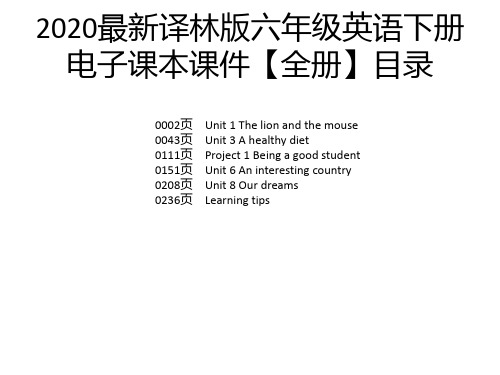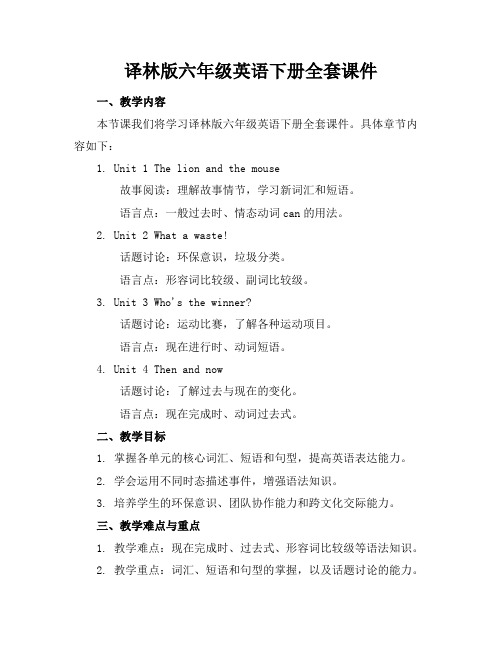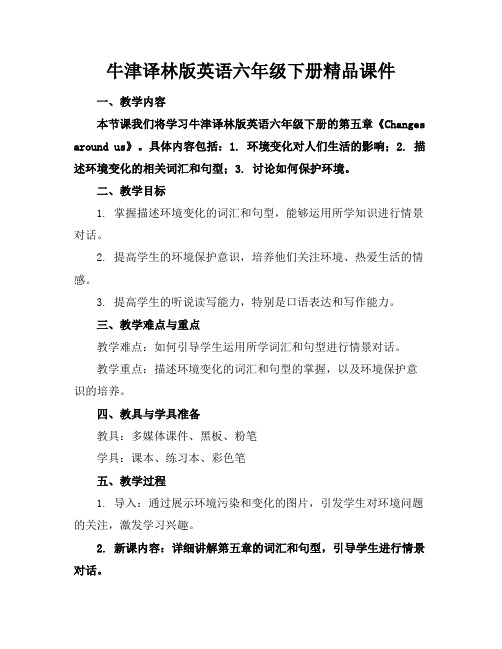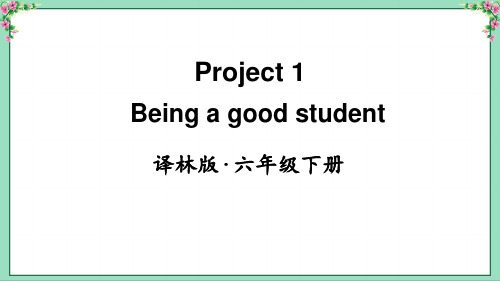译林版英语六年级下册全册完整课件【全套】
六年级下册英语PPT课件-Unit7 Summer holiday plans 译林版 19

➢ No, I won’t. I will go there by train. 不,我打算坐火车去那里。
Grammar
Where
you
go for the summer holiday
When
we
go
will
Yes, 主语+will. No,主语+won’t.
Let’s practice
Where will you go for the summer holiday?
I will go…
Let’s practice
How long will you stay
there?
I will stay there for…
Do yll go to Beijing. I will stay there for a week.
I will go to Sydney. I will stay there for a month.
I will go to London. I will stay there for two months.
?
How long they stay there
What
he she
do there
Grammar
you go to Beijing by plane
they go to the Great Wall
Will
?
he stay there for a week
she visit friends there
6.在中国,人工智能已被纳入国家科 研计划 。
例句1: I will write an e-mail to my friend tomorrow. 例句2: She will go to the library next week.
苏州市译林版六年级英语下册第四单元全部课件(共5课时)

Read and choose!
To cross the road, we must look (looks,
look) for a zebra crossing. At the zebra crossing,
we must look (look,looking) at the traffic lights. We must wait (waiting, wait) for the
1
Let’s imitate.
Do you remember?
• How to cross the roads safely • First look for __a_z_e_br_a_c_r_o_ss_in_g__ • Then look at __th_e_t_r_af_fi_c_li_g_h_ts__ • Traffic lights mean different • __R_e_d_m_a_n___ stop • _G_r_e_e_n_m__an__ go • You must wait • On the road!
Unit 4 Road safety
Checkout time & Ticking time
We must…
We mustn’t…
onathheomroead
Rule(规则)
用所给句型说出相关地点的规则,轮流进行,重复或错误不得分。
Read and underline
Discuss the differences between
Different rules around us.
Different places,different rules.
We must follow different rules in different places.
江苏牛津译林六年级英语下册第三单元全部课件(共4课时)

Let’s read the pictures
What does the story talk about ?故事谈论了什么?
Mike and Yang Ling’s diet.
你L可et以’s这r样ea回d答a:nd finish He/She has a lot of/ some/ a few/ a little … He/She e自a读ts课a文l,o圈t o出fM/ iskeo和mYaen/gaLifnegw的/日a常l食it物tle,填…入金字塔。
water eggs
bread milk fish meat
a little… a few…
some…
rice sweet food
eggs
meat
vegetables
fruit
sweets cakes ice cream rice
a lot of…
noodles
Let’s judge
Tip: 可以根据黑板提示进行判断。
锁上一层任务。
Do you want
健康饮食计划。
to challenge? I can talk about my daily meals
2. 成功完成任务的同学 可以为本组加一分。
and say something about someone
else.我会谈论自己和他人的一日三餐。
3. 最后得分最
Rdoietupnland. 4: Le我健t能康’s简饮单食p设计l计划a。n!
Round 3: I can talk about my daily meals
and say something about someone
else.我会L谈e论t自’己s和t他a人l的k一日三餐。
2020最新译林版六年级英语下册电子课本课件【全册】

Unit 7 Summer holiday plans
2020最新译林版六年级英语下册电 子课本课件【全册】
Unit 8 Our dreams
2020最新译林版六年级英语下册电 子课本课件【全册】
Unit 1 The lio本课件【全册】
Unit 2 Good habits
2020最新译林版六年级英语下册电 子课本课件【全册】
Unit 3 A healthy diet
2020最新译林版六年级英语下册电 子课本课件【全册】
Unit 5 A party
2020最新译林版六年级英语下册电 子课本课件【全册】
Unit 6 An interesting country
2020最新译林版六年级英语下册电 子课本课件【全册】
Project 2 A travel book
2020最新译林版六年级英语下册电 子课本课件【全册】
2020最新译林版六年级英语下册 电子课本课件【全册】目录
0002页 0043页 0111页 0151页 0208页 0236页
Unit 1 The lion and the mouse Unit 3 A healthy diet Project 1 Being a good student Unit 6 An interesting country Unit 8 Our dreams Learning tips
2020最新译林版六年级英语下册电 子课本课件【全册】
Unit 4 Road safety
2020最新译林版六年级英语下册电 子课本课件【全册】
Project 1 Being a good student
译林版六年级英语下册全套课件

译林版六年级英语下册全套课件一、教学内容本节课我们将学习译林版六年级英语下册全套课件。
具体章节内容如下:1. Unit 1 The lion and the mouse故事阅读:理解故事情节,学习新词汇和短语。
语言点:一般过去时、情态动词can的用法。
2. Unit 2 What a waste!话题讨论:环保意识,垃圾分类。
语言点:形容词比较级、副词比较级。
3. Unit 3 Who's the winner?话题讨论:运动比赛,了解各种运动项目。
语言点:现在进行时、动词短语。
4. Unit 4 Then and now话题讨论:了解过去与现在的变化。
语言点:现在完成时、动词过去式。
二、教学目标1. 掌握各单元的核心词汇、短语和句型,提高英语表达能力。
2. 学会运用不同时态描述事件,增强语法知识。
3. 培养学生的环保意识、团队协作能力和跨文化交际能力。
三、教学难点与重点1. 教学难点:现在完成时、过去式、形容词比较级等语法知识。
2. 教学重点:词汇、短语和句型的掌握,以及话题讨论的能力。
四、教具与学具准备1. 教具:多媒体课件、实物、图片、卡片等。
2. 学具:教材、练习册、文具等。
五、教学过程1. 导入:通过图片、视频等引入话题,激发学生兴趣。
2. 新课内容展示:呈现课件,讲解词汇、短语和句型。
3. 例题讲解:结合实际情景,讲解语法知识,进行例题演示。
4. 随堂练习:设计练习题,巩固所学知识。
5. 小组活动:分组讨论,培养学生的团队协作能力。
六、板书设计1. 核心词汇、短语和句型。
2. 语法知识框架。
3. 话题讨论提纲。
七、作业设计1. 作业题目:Write a short story about "The lion and the mouse" using the past tense.Describe the changes in your life from the past to the present, using the present perfect tense.答案:略八、课后反思及拓展延伸2. 拓展延伸:邀请学生分享自己的故事、经历,提高口语表达能力。
译林版(YL)六年级英语下册 Unit 4 Road safety 课件

• First, you must look for __a_z_e_b_r_a_c_r_o_s_si_n_g______. • Then, you must look at the __tr_a_f_fi_c_l_ig_h_t_s______.
and wait for the_g_r_e_e_n__m_a_n_____.
near you. To keep safe, you can wait on the
pavement and look out for cars and bikes. You must first look left, then right and then
left again. You can also cross the road with other people.
You mustn't cross when it's the red man.
Fill in the blanks.
选择must和mustn't填空。 1.We _m__u_st____ look out for cars and bikes. 2.You _m__u_s_tn_'_t____ play on the road. 3.You __m__u_s_t ____ first look left, then right and then left again. 4.You __m__u_s_tn_'_t___ smoke in the library.
Let's match. 1
2
3
Match the pictures and sentences.
What mustn't you do on the road?
牛津译林版英语六年级下册精品课件

牛津译林版英语六年级下册精品课件一、教学内容本节课我们将学习牛津译林版英语六年级下册的第五章《Changes around us》。
具体内容包括:1. 环境变化对人们生活的影响;2. 描述环境变化的相关词汇和句型;3. 讨论如何保护环境。
二、教学目标1. 掌握描述环境变化的词汇和句型,能够运用所学知识进行情景对话。
2. 提高学生的环境保护意识,培养他们关注环境、热爱生活的情感。
3. 提高学生的听说读写能力,特别是口语表达和写作能力。
三、教学难点与重点教学难点:如何引导学生运用所学词汇和句型进行情景对话。
教学重点:描述环境变化的词汇和句型的掌握,以及环境保护意识的培养。
四、教具与学具准备教具:多媒体课件、黑板、粉笔学具:课本、练习本、彩色笔五、教学过程1. 导入:通过展示环境污染和变化的图片,引发学生对环境问题的关注,激发学习兴趣。
2. 新课内容:详细讲解第五章的词汇和句型,引导学生进行情景对话。
3. 例题讲解:针对本章的重点知识,进行例题讲解,帮助学生巩固所学。
4. 随堂练习:设计相关练习题,让学生即时巩固所学知识。
5. 小组讨论:分组讨论如何保护环境,培养学生的合作精神和环境保护意识。
六、板书设计板书内容包括:第五章、重点词汇、句型、例题及答案。
七、作业设计1. 作业题目:请运用本章所学词汇和句型,写一篇关于环境保护的短文。
八、课后反思及拓展延伸本节课结束后,教师应反思教学效果,针对学生的掌握情况,进行针对性的辅导。
同时,鼓励学生关注生活中的环境问题,将所学知识运用到实际中,提高他们的环境保护意识。
拓展延伸方面,可以推荐学生阅读关于环境保护的英文文章,提高他们的阅读水平。
重点和难点解析1. 教学内容的情景引入2. 教学目标的制定3. 教学难点与重点的把握4. 教学过程中的例题讲解与随堂练习设计5. 板书设计6. 作业设计一、教学内容的情景引入情景引入是激发学生学习兴趣的关键环节。
针对环境变化这一主题,教师可以选择贴近学生生活的实例,如附近河流的污染、空气质量问题等,以图片、视频等形式展示,让学生直观地感受到环境变化对生活的影响,从而引出本节课的主题。
译林版英语六年级下册Project 1-2(新课件42页)

a few
Quick response Describe and judge: good habits or bad habits?
get up early go to bed early brush teeth make the bed
finish the homework messy: put things
Project 1
Being a good student
译林版· 六年级下册
Let’s have fun
Let’s sing the song together! This is the way we wash our face, wash our face, wash our face. This is the way we wash our face, so early in the morning. This is the way we comb our hair, comb our hair, comb our hair. This is the way we comb our hair, so early in the ples
fast
well
quietly
early late
excitedly
slowly
quickly
loudly
sadly
high happily
Read the adverbs
Monsters’ food
Let’s have some food!
Amy gets up early and has breakfast every day. She goes to school early. She helps her classmates. She finishes her homework before dinner. She always waits for the green man before she crosses the road. She often eats too many sweets.
- 1、下载文档前请自行甄别文档内容的完整性,平台不提供额外的编辑、内容补充、找答案等附加服务。
- 2、"仅部分预览"的文档,不可在线预览部分如存在完整性等问题,可反馈申请退款(可完整预览的文档不适用该条件!)。
- 3、如文档侵犯您的权益,请联系客服反馈,我们会尽快为您处理(人工客服工作时间:9:00-18:30)。
( 2 ) The next day, two men caught the lion with a large net... ( 1 ) One day, a mouse walked by and woke the lion up... ( 3 ) Just then, the mouse saw the lion. “I can help you,” he sai ( 4 ) From then on, the lion and the mouse became friends.
有表情地分组朗读,并 注意模仿语音语调噢!
d
a
e
c
f
b
1.复述Story time中的故事。 2.预习Grammar time内容。
The lion and the mouse
lion 狮子 large 大的 strong 强壮的
There was a lion in the forest. He was very large and strong.
small weak 虚弱的
( ) The next day, two men caught the lion with a large net... ( ) One day, a mouse walked by and woke the lion up... ( ) Just then, the mouse saw the lion. “I can help you,” he said ( ) From then on, the lion and the mouse became friends.
1. Who woke the lion up? The mouse did.
2. Did the lion eat the mouse? No, it didn’t.
sharp 尖锐的
bite-bit 咬
The next day, two men caught the lion with a large net. The lion bit the net with his sharp teeth, but that did not help. “How can I get out?” asked the lion sadly.
4. How did the mouse help the lion?
The mouse made a big hole in the net with his teeth.
The lion and the mouse became friends.
become---became
5. What did the lion and the mouse become? They became friends.
同学们,讲故事时如果用以上四个词开头, 可以让你讲的故事更有条理性噢!
1. Who woke the lion up? 2. Did the lion eat the mouse? 3. How did the men catch the lion? 4. How did the mouse help the lion?
One day, a mouse walked by and woke the lion up... The next day, two men caught the lion with a large net... Just then, the mouse saw the lion. “I can help you,” he said... From then on, the lion and the mouse became friends.
ask sadly伤心地问
3. How did the men catch the lion? They caught the lion with a large net.
net 网
make a big hole 制造一个大洞
Just then, the mouse saw the lion. “I can help you,” he said. Soon, the mouse made a big hole in the net with his teeth. The lion got out. “Thank you!” said the lion happsialyy. happily 开心地说
译林版
六年级
(下册)
[精品]
Unit1 The lion and the mouse
(Story time)
1.能正确朗读故事并理解故事内容。 2.能听懂、会读单词large, strong, weak,
net, sharp, sadly, happily, hole。 3.能听懂、会读不规则动词过去式
5. What did the lion and the mouse become?
say quietly 小声地说 laugh loudly 大声地笑
wake---woke wake...up 吵醒
One day, a mouse walked by and woke the lion up. The lion was angry and wanted to eat the mouse. “Please don’t eat me. I can help you some day,” said the mouse quietly. “You’re so small and weak! How can you help me?” laughed the lion loudly. Then, he let the mouse go.
weak-woke, bite-bit, let-let。
How was your Winter holiday? What did you do in the Winter holiday? Did you ...?
What are you going to do this term? I’m going to ...
